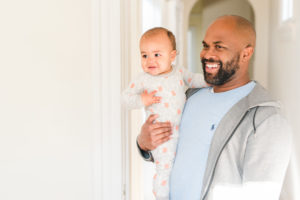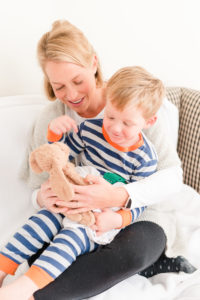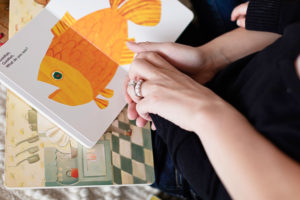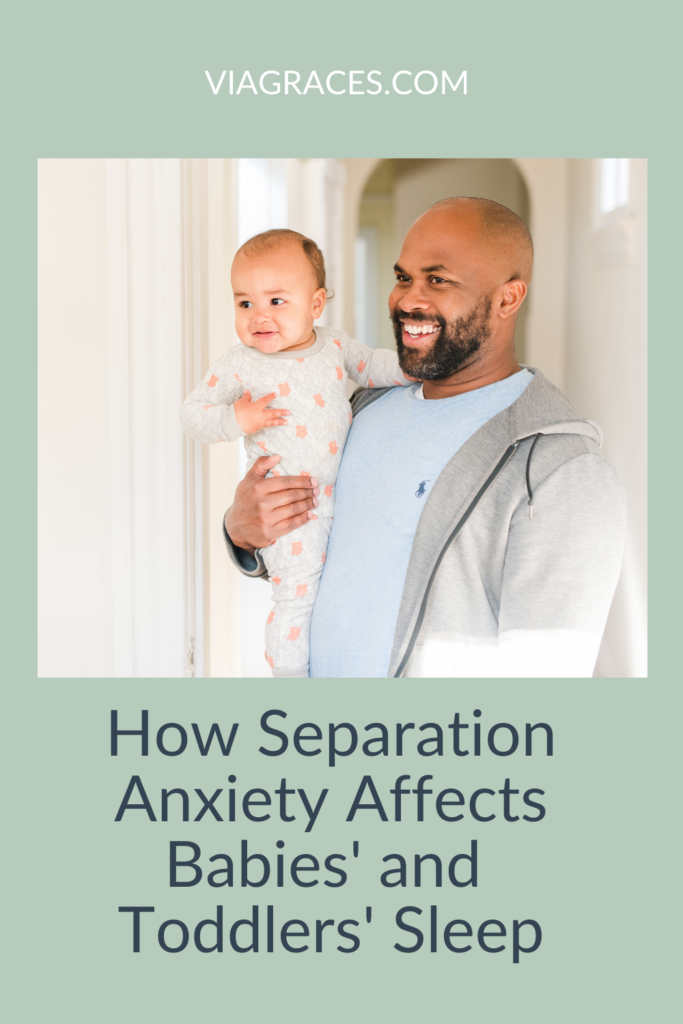Separation anxiety is real for both babies and toddlers. And some little ones seem to hit stages of separation anxiety like clockwork, especially around 9 months old and 18-24 months old. And while we can’t simply take that separation anxiety away, we can help support our babies and toddlers through it, and we can take steps to make sure it doesn’t impact their sleep for too long.

So in this blog post, we’ll talk about:
- When separation anxiety is most common in babies and toddlers
- Why separation anxiety is a normal phase of development
- How you might see separation anxiety impact your baby or toddler’s sleep
- Tips to help your baby or toddler fall asleep when they’re experiencing separation anxiety
When and Why Separation Anxiety Tends to Peak in Babies and Toddlers
Before really digging in, I first want to tell you that separation anxiety is completely normal, it’s to be expected, and it can be a sign of healthy attachment. So if your little one seems to be having an extra tough bout of separation anxiety, or if it looks different than it did with your friend’s little one, that’s okay!
Separation anxiety is normal for kids AND it won’t last forever.
Separation Anxiety in Babies
Playing peek-a-boo with young babies is so fun because when you put that blanket over your face, they actually think you’re gone. And they’re so surprised to see you again! Or when you put that toy behind your back, they actually think it disappeared and are shocked you got it back so quickly.
But around 6-9 months old, as babies start to open their eyes even wider and start exploring the world around them, they reach the milestone of “object permanence” – they recognize that even though they can’t see something, it’s still there. Even though there’s a blanket over dad’s head, he’s still there!
And I know it may not sound like it, but this learning is a big deal. And with this big new learning often comes some separation anxiety. So when mom walks into the other room and doesn’t bring baby with them, baby thinks, “Wait a second, mom isn’t here, which means she’s somewhere else. What if she doesn’t come back?! I need her now!”
As parents, we find that our once content baby wants to be everywhere we are – they need to see us at all times. They want to be held more, they want to be closer in proximity, they’re much clingier than they used to be. This is all very normal!
Separation Anxiety in Toddlers
As babies become toddlers and those toddlers continue to get older and more independent, are able to explore the world around them a little more deeply, and start to communicate more and more, we often see separation anxiety rise again. It’s almost like the separation anxiety increases as independence starts growing.
The way I think of it is they are becoming more brave to explore the big, awesome world around them, and then all of a sudden they realize there’s this big, open world that’s unfamiliar, and they retreat back to their safe place – mom and dad. They might not want to be in a separate room from you, they might want to be touching you or on your lap more often – this is often when we, as parents, start feeling extra “touched out.”
This age range tends to be much wider – some toddlers experience separation anxiety around 18 months, while some experience it closer to 2.5-3 years old. And some don’t seem to experience it at all!
And again, this is very normal.

How Separation Anxiety Impacts Baby and Toddler Sleep
For babies and toddlers who have been falling asleep and staying asleep independently for months (or years!), we often see them start fighting sleep more when going through a phase of separation anxiety. Your baby who never used to fuss when you laid them down now cries when you walk away, or your toddler who used to love sleep is now fighting it more and more – because they know you’re leaving and they want to be with you!
Similarly, for those babies and toddlers who still need help getting to sleep, you may find it extra challenging to get them to sleep. When you could once rock them, lay them in their crib asleep and walk out, trying that crib transfer just isn’t an option right now. Or for the toddler you could lay with for a bit and then leave, you better not consider walking away. They know you’re trying to leave and they just want to be with you!
All of that to say, it is COMMON for babies and toddlers to start fighting sleep when they are going through phases of separation anxiety. But once they are asleep, they’ll likely sleep like they normally do. If your little one is an independent sleeper and is now waking more in the night, or is all of a sudden taking short naps, or waking super early to start their day, that’s likely not related to the separation anxiety, but something else that can be adjusted.
So remember, separation anxiety is a very common phase, AND the effect it has on sleep doesn’t have to last forever.
Tips to Help Your Baby Fall Asleep When Having Separation Anxiety
I had not yet sleep trained my oldest when she went through her first bout of separation anxiety as a baby, so I don’t remember that phase very specifically, especially in regards to her sleep. Sleep was just hard in general! With our youngest, however, we started instilling solid sleep habits from the start with her, so she was a great sleeper.
And I absolutely remember when separation anxiety hit and how it impacted her sleep. I used to be able to lay her down, walk away, and she would quietly and peacefully fall asleep. But around 8-9 months old, she did not fall asleep so seamlessly…she fought it! She sometimes started fussing even in the nap routine or bedtime routine.
Once I laid her down, she often fussed for anywhere between 2-8 minutes, and it was not fun – no parent likes to hear their baby cry! She still fell asleep in less than 10 minutes* and was taking great naps, so I knew I didn’t need to make any changes, but I also wanted to find a way to bring joy and peace back to sleep (for all of our sakes!).
*A side note for independent sleepers: my general rule of thumb is as long as babies are falling asleep in less than 10 minutes, they are okay! We don’t need to intervene and likely don’t need to change any scheduling. If they’re starting to regularly take more than 10 minutes to fall asleep, then we want to look into schedule and routine adjustments.
So here are some strategies I used with my own daughter and also suggest to the families I work with when their little ones are experiencing separation anxiety:
Baby Wear
During awake times, wear your baby more often than you usually do! Fill up their little “touch tanks” and give them that closeness more than you normally would.
Story Time
Before my daughter started fighting sleep, we used to read one story in her nap and bedtime routines. When she started going through this separation anxiety, we added in another story! That was a few extra minutes she could cuddle mommy or daddy before sleep, and a few extra minutes to prepare herself for sleep.
I also tried to choose books that she could interact with – we would search for the mouse in Goodnight Moon, touch all the farm animals in her textured book, etc.
Get Silly!
In addition to being more intentional with the books in our nap and bedtime routines, I tried adding some silliness (aka distraction!) into our routines. When it was time to get our daughter into her sleep sack, rather than simply laying her down and zipping her in, I would count to three and “throw her” into her sleep sack. It added some excitement, some giggles, and some distraction to the separation that was soon coming.

Tips to Help Your Toddler Fall Asleep When Having Separation Anxiety
Consistency is always important with kids, but especially with toddlers. While we absolutely want to support our toddlers through their separation anxiety, we also don’t want to head down the slippery slope of supporting them fully to sleep when we haven’t done so for months or years. It doesn’t take long for toddlers to recognize the new pattern and hang on to it!
I actually don’t recall a specific time either of my girls experienced a lot of separation anxiety around sleep as toddlers, and that just goes to show how every child is different! But here are some strategies I recommend using for toddlers experiencing separation anxiety:
One-on-One Time
Having intentional one-on-one time with your child every day, or as much as possible, can make SUCH a difference for them, both to their behavior and to their sleep. That might be 10-15 minutes of doing puzzles, playing a board game, building a Lego tower, running around outside, etc. – but that one-on-one time with no phone, no laundry to be folded, no dinner to be made, just undivided attention, goes a long way.
Mom and dad might be leaving after putting me to bed, but we had a lot of fun today!
Get Silly!
Distraction also goes a long way with toddlers. Rather than walking to their room before nap or bedtime, crab walk or wheel barrel them over. Play silly songs while brushing their teeth. Mismatch their jammies. Read books in a different spot in the room or in silly voices! That silliness and those extra changes can go a long way in distracting them from the day to day routines they are starting to anticipate or fight.
Conclusion
Separation anxiety is a very normal part of baby and toddler development, and it can’t really be avoided. And it’s not uncommon to see that separation anxiety interfere with our little one’s sleep! There are, however, strategies we can use during the day and around sleep times to help our little ones feel more at ease and fall asleep more smoothly, so give these tips and tricks a try!
If your toddler isn’t experiencing separation anxiety as much as they are fears around bedtime, checkout this blog post! Or if you’re wondering if your little one is going through a sleep regression versus separation anxiety (usually connected to a physical or verbal milestone!), checkout these posts about baby sleep regressions and toddler sleep regressions.
With Grace,
Lauren
